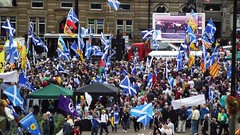Independence Day
I’m sure I’m not the only one pining for the parallel universe where Scotland voted yes, so I reckon this will be one of many alternate histories published today.

And when the journalists had departed, the businesses moved in. A lot of them realised they suddenly needed a Scottish presence now, and I got contacted by a lot of Danish companies who asked for advice on where to place their office. Most of them wanted to be in Edinburgh, of course, so property prices there exploded — apart from the companies opening up offices there, sixty countries simultaneously started setting up embassies.
Most changes were political, though. David Cameron of course resigned the day after the referendum, and he was unsurprisingly replaced by George Osborne. (There was also a minor scandal when Cameron accidentally revealed that the Queen had been sobbing on the phone when he called her to tell her the result.) One of the first things Osborne did was to make a deal with Labour that postponed the Westminster election by one year — everybody quickly realised that conducting a general election during the independence negotiations would be mad. At the same time all Scottish MPs were excluded from the UK government, and many of them joined Salmond’s independence negotiation team instead.
This negotiation team was a true cross-party effort (albeit dominated by the SNP, of course). Nicola Sturgeon, John Swinney, Kenny MacAskill, Patrick Harvey, Danny Alexander, Jim Murphy and Douglas Alexander were put in charge of a subgroup each, reporting directly to Alex Salmond.
It soon became clear that the SNP was starting to fall apart. Now that the pursuit of independence wasn’t there any longer to unify the different strands of the party, it simply couldn’t hold together, and members started leaving. Labour was the big winner. As soon as they had cut their ties to the UK HQ, they decided to make the best of independence, which was exactly what people wanted to hear, and they soon overtook the SNP in the opinion polls. Of course the elections to Holyrood won’t take place till May this year, but everybody is expecting Jim Murphy to become the Prime Minister of Scotland at that point.
The SNP’s decline is probably in part due to the falling oil prices. It’s not an enormous problem, though, not least because of the influx of new companies from all over the world. There is also a cross-party agreement to change the taxes to tailor them better to the Scottish economy, and this will reduce the deficit significantly. However, in order to achieve healthy finances from day one, it was decided to allow the rUK to keep Trident in Scotland until 2025, but the rent charged is astronomical.
Continued EU membership turned out not to be a problem after all. As soon as it became clear that Westminster were accepting the result of the referendum, all EU governments (including Spain) were happy to cooperate, and the treaties were swiftly amended in time for Independence Day.
Normal politics has now been on hold for a while, so both in Scotland and in the rUK (or rather, the United Kingdom of England, Wales and Northern Ireland as it will be known officially from today) people are now looking forward to doing independence instead of talking about it. People in the UKEWNI are perhaps more anxious, and they seem to be blaming the Tories for the whole thing, so the latest opinion polls indicate that Labour will win the election and the Liberal Democrats will become the official opposition south of the border in May. This also means, of course, that Brexit is off the agenda for good, which is probably a good thing for Scotland, too.
I’m so happy that Scotland voted Yes, and according to opinion polls, 64% of Scots now agree with me.
Independence Day https://t.co/MxTwODGChB
Independence Day https://t.co/AUe7Ard508
Independence Day | Arc of Prosperity https://t.co/8nN8wHzQLo
My take on the ubiquitous “What If Scotland had voted Yes”: https://t.co/57a26n76Rh #StillYes